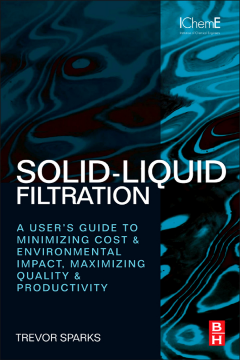
Additional Information
Book Details
Abstract
Exploring the success factors that combine to deliver this performance. Finding ways to get more from your processes, with examples, case studies and scenarios.
Solid-Liquid Filtration is a crucial step in the production of virtually everything in our daily lives, from metals, plastics and pigments through to foods (and crockery) and medicines. Using a practical and applied approach, Trevor Sparks has created a guide that chemical and process engineers can use to help them:
- Understand how filtration processes affect production processes, production costs, product quality, environmental impact and productivity
- Optimise process development and project execution, with real examples and supporting software forms and tools
- Develop reporting tools to monitor processes, and find ways to get more from processes
This book’s focus is helping process engineers understand their filtration processes better. Its accessible approach and style make it a valuable resource for anyone working in this sector, regardless of prior knowledge or experience.
- Several examples and scenarios are provided throughout the book in order to help engineers understand the importance of filtration and the effect that it has on the bottom-line.
- Covers methods for optimizing processes, include process variable, plus laboratory testing, modeling and process troubleshooting
- Accompanied by optimization software that enables readers to model and plan optimal filtration processes and set ups for their particular circumstance.
"An Irish-based consultant to both end users and technology providers of filtration, Sparks offers a guide to engineers and technicians in processing plants and other operations that separate solids and liquids using filters. His topics include the physical phenomena of solid-liquid filtration, competitiveness in processing, filter design, process testing, and getting the most from filtration processes." --Reference and Research Book News, October 2012
